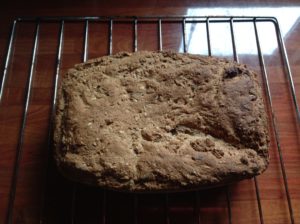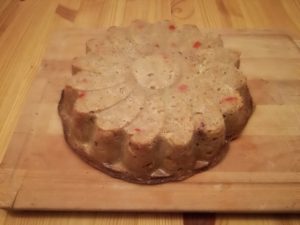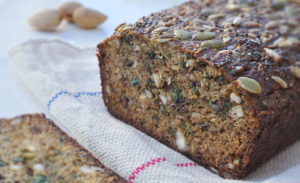This is one the healthiest bread recipes I have come up with. It may not have the oily and salty attraction of some other breads – because, well… it has NO OIL OR SALT!
We can all get rather addicted to the convenience, texture and taste of commercially-prepared breads. The tastier and more “spongy” they make the bread, the more they will sell.
But I wanted a bread that provides most of the convenience, texture and taste that we expect from bread, but without the fragmented food elements and chemicals that may be added, including: salt (1.), sugar, (my recipe contains a small amount but commercial bread can contain lots), trans fats (“partially hydrogenated oils” – linked to serious health risks (2., 3.)), potassium bromate (oxidising agent), azodicarbonamide (dough conditioner/bleacher), monoglycerides & diglycerides (emulsifiers E471), butylated hydrocyanisole (BHA preservative linked to cancer (4., 5.)), caramel colouring (linked to cancer (6., 7.)), high fructose corn syrup (HFCS linked to heart disease and diabetes (8.)), Undeclared GMO Soy oil (9.), vegetable oils (10,. 11,. 12,). And this is not a definitive list..
And if you still think that adding vegetable oils (even really expensive extra virgin olive oil) is a healthy option, you may want to check out some of my future blogs. In the meantime, a brief word from Dr Caldwell Esselstyn.
So, after all that waffle, here’s the recipe:
Whole Wheat Seeded Health Bread.

This basic recipe forms the canvas on which the rest of the health bread recipes I use are formed. This recipe is incredibly versatile, and makes a delicious, moist health bread that can be enjoyed with any kind of meal. It is also delicious served with natural fruit preserves and organic, natural nut butters. These health breads don’t require kneading, as the ingredients form more of a batter than a dough once mixed together.
Preheat the oven to 390 degrees (200 degrees Celsius gas mark 6). This recipe yields three loaves, so you will need three silicon medium-sized loaf tins – silicon so that they do not stick, being that no grease or oils are used.
Ingredients:
4 cups (1kg) organic wholewheat flour. I vary this from time to time by adding differing amounts of wholemeal ancient flours – usually rye and spelt, but also sometimes Khorasan also called kamut (adds sweetness) or einkorn.
35-75ml organic raw brown sugar (I use as little as possible and let it rise for longer).
2 tablespoons (30ml) instant dried yeast.
0.5-1.5 cups (75-200g) mixed seeds (can include pumpkin, poppy, sunflower, sesame, flax, chia).
4 cups (1 litre) lukewarm water.
Instructions:
Dissolve the sugar in the lukewarm water and sprinkle the yeast over the top. Cover tightly with cling film and a dish towel, and set aside for the yeast to activate, it will start to bubble when it has activated.
In a large mixing bowl, mix together the flour and seeds. Add the water, sugar and yeast mixture and mix very well to form a slightly runny batter. Divide the batter equally amongst the loaf tins which should be on a firm metal baking tray. Place the bread tins somewhere warm and draught-free until the batter has risen and the loaves have doubled in size. Bake for 45-50 minutes, until a dark crust has formed and the bread sounds hollow when tapped. You can also check that they are completely baked by using a skewer or knife. If there is any batter sticking to the latter, put them back in the oven for another 10 mins or so. Allow the loaves to cool in the tins for ten minutes before turning out onto a cooling rack.
Try it. Vary it. Improve on it. And let me know how you get on.
The following is Yuri’s “Flower Bread” – basically the same recipe with added red pepper and garlic, but made in a wonderful flower-shaped silicone bread/cake tin that he found in Italy.


Fantastico!
References
- https://nutritionfacts.org/topics/salt/ “Dozens of similar studies demonstrate that if you reduce your salt intake, you may reduce your blood pressure. And the greater the reduction, the greater the benefit may be. But if you don’t cut down, chronic high salt intake can lead to a gradual increase in blood pressure throughout life.”
- Vandana Dhaka, Neelam Gulia, Kulveer Singh Ahlawat, and Bhupender Singh Khatkarcorresponding. J Food Sci Technol. 2011 Oct; 48(5): 534–541. Published online 2011 Jan 28. doi: 10.1007/s13197-010-0225-8. Trans fats—sources, health risks and alternative approach – A review
- Trattner S, Becker W, Wretling S, Öhrvik V, Mattisson I. Food Chem. 2015 May 15;175:423-30. doi: 10.1016/j.foodchem.2014.11.145. Epub 2014 Dec 3. Fatty acid composition of Swedish bakery products, with emphasis on trans-fatty acids.
- Otterweck AA, Verhagen H, Goldbohm RA, Kleinjans J, van den Brandt PA. Food Chem Toxicol. 2000 Jul;38(7):599-605. Intake of butylated hydroxyanisole and butylated hydroxytoluene and stomach cancer risk: results from analyses in the Netherlands Cohort Study.
- https://ntp.niehs.nih.gov/ntp/roc/content/profiles/butylatedhydroxyanisole.pdf.
- https://www.fda.gov/downloads/Food/GuidanceRegulation/FSMA/UCM517402.pdf.
- Garima Sengarcorresponding author and Harish Kumar Sharma. J Food Sci Technol. 2014 Sep; 51(9): 1686–1696.
Published online 2012 Feb 9. doi: 10.1007/s13197-012-0633-z. Food caramels: a review. - James M. Rippe Theodore J. Angelopoulos. Advances in Nutrition, Volume 4, Issue 2, 1 March 2013, Pages 236–245, https://doi.org/10.3945/an.112.002824. Sucrose, High-Fructose Corn Syrup, and Fructose, Their Metabolism and Potential Health Effects: What Do We Really Know? N.B. The symposium was supported in part by an educational grant from the Corn Refiners Association (I ALWAYS SUSPECT BIAS WHEN THUS FUNDED).
- https://nutritionfacts.org/video/gmo-soy-and-breast-cancer/. “The bottomline is that there is no direct human data suggesting harm from eating GMOs, though in fairness such studies haven’t been done, which is exactly the point, critics counter. That’s why we need mandatory labeling on GMO products so that public health researchers can track whether GMOs are having any adverse effects.”
- https://nutritionfacts.org/topics/vegetable-oil/. “Research confirms that ingestion of oil, no matter which type of oil or whether it was fresh or deep fried, showed a significant and constant decrease in arterial function.”
- https://www.drmcdougall.com/misc/2007nl/aug/oils.htm.
- http://nutritionstudies.org/plant-oils-are-not-a-healthy-alternative-to-saturated-fat/
